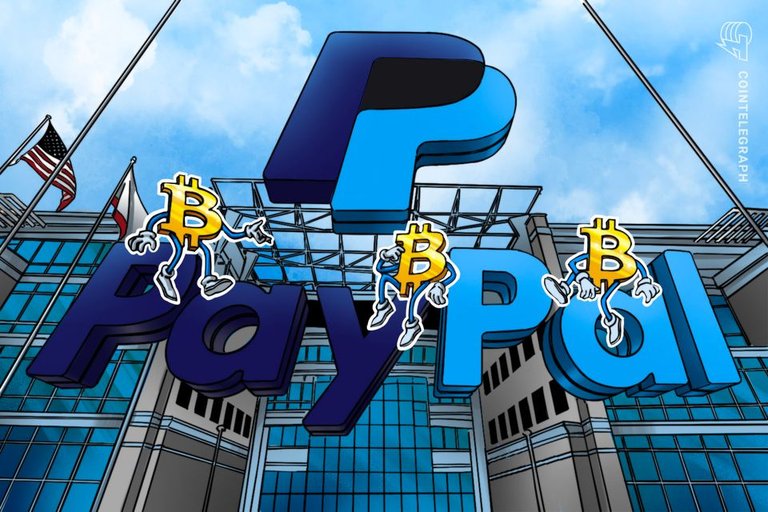The early failures of Paypal's stablecoin prove the crypto space is serious about decentralized finance

It is becoming evident that crypto is the future of finance and the integral structure upon which major businesses will be built on.
This is generally due to the empowerment that comes with crypto and blockchain technology, the diversified management of token and community economies though rough shows the flexibility of the ecosystem and the opportunities it offers individuals and businesses to build and scale.
Technology is at a point of explosion with crypto taking over finance and artificial intelligence ushering us into an age of autonomous operations. The urgency to adopt these new technologies is unfolding as the day goes by but the majority will make costly mistakes attempting to rewrite its realities.
PayPal is one of the majority.
It's no news that PayPal now operates a stablecoin on the infamous Ethereum blockchain, lmao, Ethereum had some great visions for decentralized finance and all of that, but right now, the chain has some pretty bad qualities and at the top of it all is the centralization of the network.
What's the value of a base layer crypto network if it is inherently centralized?
PayPal choosing Ethereum comes as no surprise, While I'm tempted to say it has something to do with the realities of Ethereum closely evolving into the bankers' chain, I want to believe it's also a thing of capturing the large Ethereum market.
But did they fail to properly study the target audience and understand better what product would scale? Bad Marketing realities?
PayPal should have launched an NFT Project instead
Or a memecoin, that would have definitely created some buzz, probably would have seen them degens publicizing theories and speculations like "This Paypal shitcoin could gain significant utilities over the years - more like hopefully in two weeks" Yeah right, the utility of occupying valuable space in your wallet and the blockchain.
Then again, an NFT project would have probably made the company some quick money. It doesn't matter what the project would be focused on, a company like PayPal should have great copywriters to publicize actionable pieces of shitty whitepapers for a successful NFT project, but of course also prepare to settle a lawsuit with part of the generated revenue - win win yeah?
Ethereum tends to rob off on these types of projects because people over there just mostly want to pump and dump, extract, extract, extract. What good is a centralized stablecoin with zero value streams? Even if there were one, remember UST and LUNA? Yeah, the ecosystem is yet to heal from all that.
Lessons from the failures of The Metaverse projects
The influx of projects claiming to be building "The Metaverse" yet failing stupidly should have taught other entrepreneurs and product developers how strict this ecosystem is on "Value 4 Value" business models.
But no no, PayPal had to bring its shit thirst for power to attempt centralizing the stablecoin markets, How is that going?
On a line-by-line basis in the smart contract’s code, PYUSD presents a litany of problems and vulnerabilities that clash directly with crypto’s decentralized framework.
PYUSD’s code has a function called “wipeFrozenAddress” that “Wipes the balance of a frozen address, and burns the tokens.” This means the tokens are taken from the user and wiped from the total supply of tokens with no recourse, akin to throwing dollar bills into an incinerator.
PYUSD also has a built-in “pause” functionality, suggesting that PayPal can stop transfers or trades of its tokens universally at any time, potentially causing a massive loss of value.
Imagine if the U.S. government could push a button and make all the physical dollar bills in your wallet unusable until further notice, and you only found out when you tried to buy a cup of coffee.
With PYUSD, the discretion of confiscating funds from users remains solely in the hands of a company that has shown time and again it cannot be trusted with such power. - Coindesk Report
Apparently, it's not going pretty well for PayPal because 90% of its stablecoin supply is still on Paxos, its partner, and over 7% outstanding supply is controlled by exchangers. The supply held by users in non-custodial wallets is still small that the highest holder has less than $10,000 worth of PYUSD as per The Block Report.
PayPal's failure to buy out the cryptocurrency stablecoin market with its centralized shithole is simply proof of how people around here will react to most centralized traditional assets and the likes of CBDCs. There's no replacing crypto, this technology is the definition of resilience.
Or it might be the fact that regulatory lack of clarity is keeping institutions and other big players away. After all, Gensler never misses an opportunity to call it fraud and a scam.
What would "institutions" really want with the stablecoin at it's current state? Doesn't seem to offer anything unique but rather have too many shady smart contracts design.
For the same reasons as everyone else.
Cross border payments. Remittance. Parking spot for trading activities.
It is why JP Morgan is testing out their own coin among the banks. The benefits of this system, especially compared to the patched together international system is light years apart.